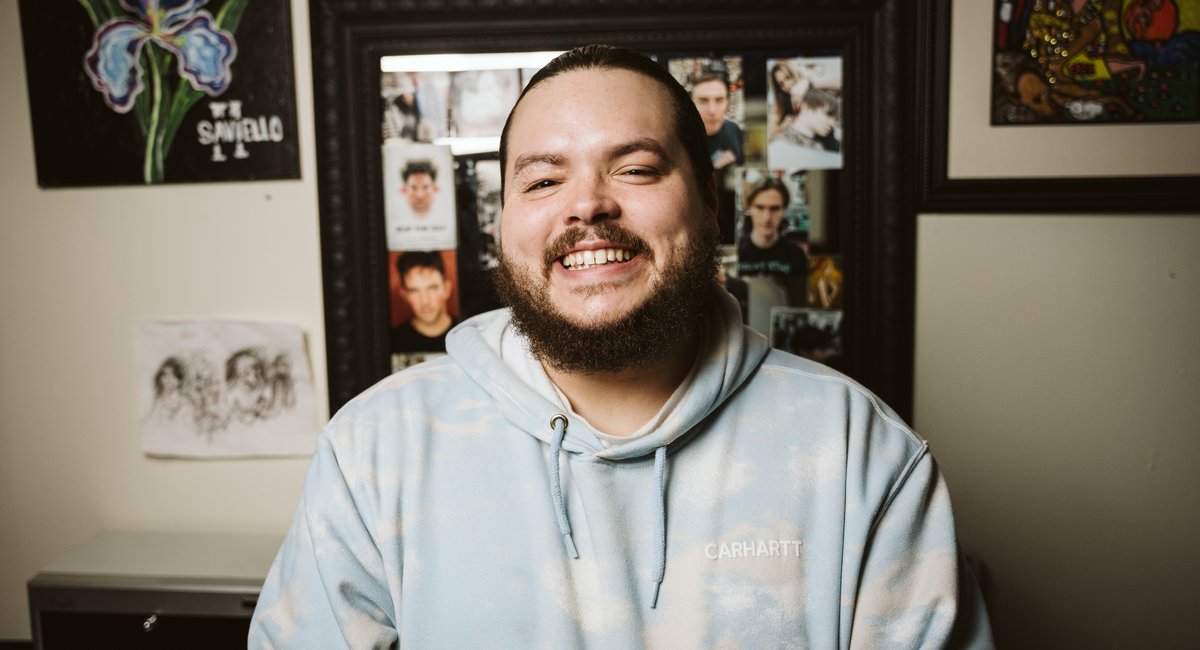Brooklyn-based comedian Matt Koff is an Emmy Award-winning writer for “The Daily Show.” Despite his comedic success, he misses the days when the only goal was to get laughs in the room.
Now, he said, he feels pressure to get laughs and go viral on social media. He posts sporadically on Instagram, but said he can’t keep up with “posting like a million TikToks a week.”
“As somebody who’s been doing it for a while, I’m just kind of annoyed by it, but I know that’s probably not the right attitude,” Koff said.
He’s among 10 comedians from across the United States and abroad who are vying for the title of “New York’s Funniest Stand Up” on Saturday, Nov. 11, at the New York Comedy Festival.
Matt Koff
Courtesy New York Comedy Festival
Many of the comedians are relatively established but not household names. Each will perform a 10-minute set in front of industry insiders, including agents, club owners and managers. The winner will get bragging rights, plus a cash prize of undisclosed value.
At the competition, the comedians will be judged by their act in the room. But the New York-based comics interviewed for this article say they feel pressure to perform on social media, too.
It’s a change that’s been happening in the industry since the creation of YouTube in 2005 and has been exacerbated by sites like Instagram and TikTok, said Caroline Hirsch, who founded the New York Comedy Festival and owned the legendary standup comedy club Caroline’s, which closed in December after 40 years of business.
The New York Comedy Festival runs through Nov. 12. Here, nine comedians competing to be “New York’s Funniest Stand-Up” pose with Caroline Hirsch, pictured far-right.
Courtesy New York Comedy Festival
Hirsch said that social media has become a vital part of many comedians’ acts.
She said that decades ago, standups like Jay Leno, Jerry Seinfeld and Garry Shandling – who all appeared at Caroline’s – only had to work a room in real life.
A big break back then, she said, was to get a gig on “The Tonight Show,” then maybe “The Late Show with David Letterman.”
Each appearance was an opportunity to prove yourself to the gatekeepers who could launch your career.
But now, she said, making a name for oneself begins on social media.
“It’s created a way for comedians to put out their own specials just taping themselves and putting it out there,” she said.
Still, according to Hirsch, going viral or building a following online is just a start, and doesn’t necessarily guarantee a career.
“The trick is to then stay focused and stay talented,” she said. “A few people are able to obtain a little bit of that, but never really go on to do very much after that.”
Julio Diaz
Courtesy of New York Comedy Festival
Koff, the writer from “The Daily Show,” isn’t the only one who feels pressure to post online.
Comedian Julio Diaz, also from Brooklyn, is also vying to be “New York’s Funniest Stand Up.”
Diaz, who has 30,000 followers on Instagram and 21,000 on TikTok, said comedians need an online presence to show they can attract audiences and, by extension, dollars.
“You have to be a small business first, not just somebody asking for business,” he said. “You have to be your own PR person. You got to be your own manager. You have to learn how to edit, too.”
“There’s a saying ‘I’ll help you push your car if I already see you pushing it,’ Diaz added. “So these industry people want to see you pushing your car already.”
Jake Velazquez
Courtesy of New York Comedy Festival
Jake Velazquez, who was born and raised in the Bronx, is another contestant.
He’s been doing stand-up comedy since 2017, performing at clubs around the city, including Eastville Comedy Club, The Comedy Shop and The Tiny Cupboard.
Last year, he was part of the festival’s “Comics to Watch” series, the annual showcase for comedians from around the country.
Although he has 23,000 followers on Instagram and a YouTube page, he lacks a TikTok account. He said he just hasn’t gotten around to making one.
“If you want to be a national headliner then you have to be on social media, because it’s just how you get your audience now,” he said.
Velazquez said he appreciates how online platforms have given people a chance to promote their material and bypass gatekeepers.
But he said people who rely on online platforms for their comedy fix may be missing out on his favorite style, longform, which doesn’t fit into the short time constraints of social media.
Comedian Pat Burtscher
Courtesy of New York Comedy Festival
“It warps people’s perceptions of what a comedy show is,” Velazquez said. “Because it’s a lot of crowd work or just 30-second to one-minute clips.”
Still, not everyone is convinced that social media is the only way to make a name for yourself.
New York-based comedian Pat Burtscher said becoming a comedian isn’t like becoming a doctor or lawyer, because there’s no obvious career path.
To him, this means using social media is a case-by-case decision based on the merits of each platform.
He’s posted consistently on Instagram, where he has almost 33,000 followers. But for now, he’s not very active on other sites, including TikTok and YouTube. He said all the options are “confusing.”
“By the time it settles and you’re like, ‘Oh, this is what you have to do,’ there’ll be another app or whatever people are going to be using to get their entertainment,” he said. “And then you always have to figure out how do I get there? So they’ll come to live shows.”
The New York Comedy Festival runs through Sunday, Nov. 12, at various locations across the city. “New York’s Funniest Stand-Up” competition is Saturday, Nov. 11, at 3:30 p.m. at the Hard Rock Hotel New York. You can learn more about the festival here.
